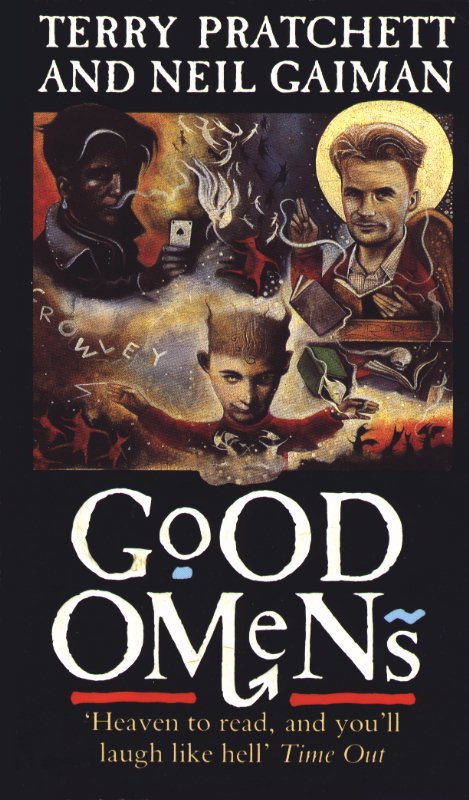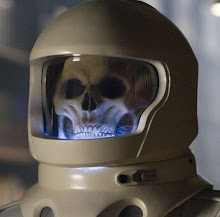 I've spent quite a lot of time reading the novel Good Omens, a collaboration between two brilliant authors, Neil Gaiman and Terry Pratchett. I've mentioned my love of Gaiman before, in my review of his book Anansi Boys some time ago, and I've also enjoyed a couple of Pratchett's Discworld series. I wasn't aware that the two of them had ever worked together until very recently when I saw Good Omens on a bookshop shelf. I've read it mostly in short segments because I've been quite busy recently, but I finally finished it a few weeks ago and now I've decided to do a review of it.
I've spent quite a lot of time reading the novel Good Omens, a collaboration between two brilliant authors, Neil Gaiman and Terry Pratchett. I've mentioned my love of Gaiman before, in my review of his book Anansi Boys some time ago, and I've also enjoyed a couple of Pratchett's Discworld series. I wasn't aware that the two of them had ever worked together until very recently when I saw Good Omens on a bookshop shelf. I've read it mostly in short segments because I've been quite busy recently, but I finally finished it a few weeks ago and now I've decided to do a review of it.The plot of the book chiefly concerns the coming of Armageddon. The son of Satan, the Antichrist, is born on Earth; however, due to a mishap at the hospital, Satan's son is given away to a normal family. Eleven years later, and 'Adam', son of Satan, is about to unknowingly unleash the apocalypse. The book follows several different characters, but Aziraphale and Crowley - an angel and demon respectively - are the chief protagonists. The two of them have both become comfortable with their lives on Earth, and as such (despite being polar opposites, good and evil), attempt to work together to avert the apocalypse. The story is also told from the perspective of Adam's gang, known as Them, and from that of the four Horsemen of the Apocalypse.
This being a Gaiman and Pratchett novel, the writing style is the thing that sticks in my mind the most. It is utterly fantastic; both authors have a very intelligent, long-winded way of structuring sentences that makes each and every line a pleasure to read. It's akin to a talented director shooting a film; not content with simply telling the story, the authors instead strive to find the most inventive, original and entertaining way to present the novel to the reader. This extra flourish of distinctive authorial style is what elevates a novel into the upper echelons of quality, and Good Omens is no exception.Gaiman and Pratchett go one step further, however, by adding a series of witty, tangential footnotes to the novel, that either expound upon incidental details or simply make clever jokes. The book is framed being 'based on the prophecies of Agnes Nutter' (a witch who predicted the events of the novel), with Gaiman and Pratchett acting as editors and compilers of the material. Whereas in any other novel the footnotes would break up the flow of the story and ruin the immersion for the reader, this framing device makes them seem natural and fitting to the story.
The novel's humour is another undeniably excellent factor. Obviously both of the authors have shown in other works that they know how to be funny - if any author can seamlessly blend fantasy and comedy, Pratchett can - but Good Omens takes their skills to new heights. Partly this is down to the diverse subject matter that the book is satirising; the wide range of subtle winks and nudges the novel gives to religious lore and legend adds another level to the humour, like an in-joke that the entire audience is in on. Things like Aziraphale misplacing the flaming sword from the Garden of Eden, or Pestilence (one of the four Horsemen) retiring and being replaced by Pollution, following the invention of penicillin. Of course, the book is also as hilarious as it is because of Gaiman and Pratchett's skill with dialogue. The exchanges between Crowley and Aziraphale are bursting with clever quips and one-liners, and several of the secondary characters are built around speech quirks that make even the most innocuous sentence a stand-out comedy moment (Witchfinder Shadwell's strong accent, for example, or Death speaking in all-caps).
However, while many of the minor characters do have comical traits as their defining characteristics, it doesn't mean that they aren't fully fleshed out as individuals. Each of the characters, even minor faces like the other members of Adam's gang, and the hell's angels, are given just enough characterisation to be likable, without their development bogging down the story. There's something in the way that the book describes and introduces these sideline characters that immediately endears you to them. Despite the ridiculous and often impossible nature of many of the characters, you can't help but sympathise with their problems and support their endeavours. That's not to say that the major characters don't pull their weight, though; I'm really not doing the book's diverse cast of characters justice in continuously referring to Crowley and Aziraphale in my examples, but I'm going to talk about them again now because they are the two who stick in my mind the most. On first introduction, the pair of them are little more than parodies of two famous biblical figures; Crowley is the serpent who tempts Adam and Eve in the Garden of Eden, while Aziraphale is the angel who guards the gates of the garden with a flaming sword - the book did start off life as a parody, after all. But slowly, as the novel deepens, we see past the satirical exteriors and get to know the characters. Aziraphale is a second-hand book dealer. Crowley's attitude to causing havoc is far too modern, and he is scorned by his outdated fellows because of it. The little things begin to add up, and before too long you realise, without consciously deciding it, you have fallen in love with this pair.
The plot of the novel is actually deceptively simple. Adam, son of Satan, has the power to accidentally cause the apocalypse. After he begins to unleash this power, very little happens in the way of plot twists or turns. The story is mostly focused on the various characters rushing to Adam, either to assist the beginning of the rapture or to prevent it. The complex nature of the novel instead comes from the multiple perspectives and presentation, with the writing style I mentioned earlier compensating where other stories might flounder. That's not to say it's a case of style over substance. On the contrary, the raising stakes of the ticking countdown to Armageddon provide the story with plenty of tension and drama, and you never reach a point in the story where the action lulls long enough for you to get even remotely bored.
I honestly couldn't say a bad thing about this novel if I tried. I've covered the writing, humour, characters and story and I still feel like I haven't said enough. I really can't recommend this one more. If you are a fan of Gaiman, buy it. If you're a fan of Pratchett, buy it. If you're a fan of comedy, buy it. If you're a fan of fantasy, buy it. Hell, if you're a fan of books, buy it.
So, that's me done for today, I think. I've recently been reading one of my favourite book series, the Tales of the Ketty Jay, which I definitely want to do a blog post about at some point, so watch out for that. In the meantime, I'm not sure what you should expect. I've not been posting as much recently for several reasons, but hopefully you'll see a bit more from me over the next few weeks. Until next time, thank you very much for reading - and feel free to leave a comment if you liked what you read. Goodbye!

No comments:
Post a Comment